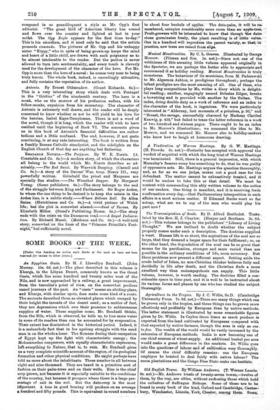SOME BOOKS OF THE WEEK.
[Under this heeding les notice such Books of the nook as have not Wan reserved for roving in (Alter forms.]
An Egyptian Oasis. By H. J. Llewellyn Beadnell. (John Murray. 10s. Gd. net.)—The place described in this volume is Kharga, in the Libyan Desert, commonly known as the Groat Oasis,' which 'lies some hundred and twenty miles west of the Nile, and is now approached by a railway, a .great improvement, from the . traveller's point of view, on the somewhat perilous camel journeys of the past. An " oasis " means an abiding-place, and Kharga, with similar spots, does make some kind of a route. The ancients described them as elevated places which escaped by their height the inroads of the desert sand ; as a matter of fact, they are depressions which owe their presence to subterranean supplies of water. These supplies come, Mr. Beadnell thinks, from the Nile, which is observed, he tells us, to lose more water in some of its reaches than can be accounted for by evaporation. Their extent has diminished in the historical period. Indeed, it is a melancholy fact that in his agelong straggle with the sand man is on the whole a loser. The Romans during their occupation of Egypt kept up the fight with characteristic energy ; the Mohammedan conquerors, with equally characteristic supineness, left everything to Nature, that is, to rain. Mr. Beadnell gives us a very complete scientific account of the region, of its geological formation and other physical conditions. He might perhaps have told -us more about the inhabitants. These number in all between eight and nine thousand. They are taxed in a primitive sort of fashion on their palm-trees and on their wells. Rice is the chief crop grown, not because it is especially suitable to the conditions of the country, but because it prospers where there is a large per- centage of salt in the soil. But the date-crop is the most iifiportant. A tree in good bearing will produce on an average a hundred and fifty pounds. This is equivalent in round numbers to about four bushels of apples. The date-palm, it will be re. membered, occupies considerably more room than an apple-tree. ' - Fruit-growers will be interested. to know that though the date. stone germinates freely, the plant resulting is of little value. • One in a hundred will reproduce the parent variety, so that; in- practice, new trees are raised from slips.






































 Previous page
Previous page